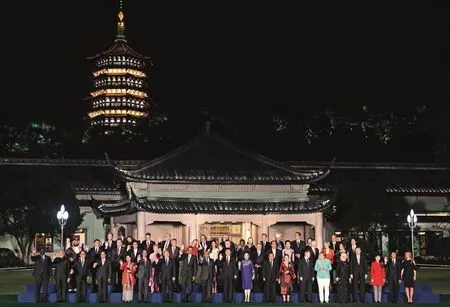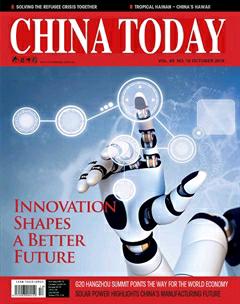G20 Hangzhou Summit Points the Way for the World Economy
By HE YAFEI
G20 Hangzhou Summit Points the Way for the World Economy
By HE YAFEI

Chinese President Xi Jinping and his wife Peng Liyuan hold a banquet at the Xizi Hotel in Hangzhou to welcome foreign heads of delegations and all other participants in the G20 Hangzhou Summit on September 4, 2016.
The achievements of the G20 Hangzhou Summit will without doubt influence global economy and governance in a significant way.
THE 2016 G20 Summit was successfully held in Hangzhou, China on September 4 and 5. This fruitful meeting has set the course for the world in such respects as economic growth, response to global challenges, and global governance system reform.
The world economy again stands at a crossroads since the financial crisis of 2008. China, having lived up to expectations, contributed its wisdom and proposals to encourage the leaders of G20 members to reach a consensus on pursuing innovative, invigorated, interconnected and inclusive world economic growth. The achievements of the G20 Hangzhou Summit will without doubt influence global economy and governance in a significant way.
Over the years, the G20 has been devoted to encouraging the world’s economy to grow through sustainability,balance, and inclusiveness. Nevertheless, growth momentum has been challenged lately by various risks and pressures. Over the last eight years the shadow of the financial crisis has loomed over the world. New technologies and industrial revolutions replace the old, but have not saved the world from economic downturn. Moreover,major economies are faced with“graying” populations. Anti-globalization and protectionism are rising in some developed countries, affecting economic globalization, the multilateral trade system, and free trade and investment. In addition, financial risks including over-leverage and economic bubbles are increasing worldwide.
In Hangzhou, G20 leaders agreed to continue enhancing communication and coordination of the G20’s macropolicy. On top of that, the G20 Blueprint on InnovativeGrowth was adopted to support innovation of development concepts, systems and mechanisms, and business models stimulated by technological innovation. Having reiterated the commitment to reject protectionism, the G20 Strategy for Global Trade Growth and the G20 Guiding Principles for Global Investment Policymaking were worked out as well.
China’s contribution in helping realize these action plans cannot be overlooked. Innovation, coordination,green development, openness and sharing - the new development concepts of China - have been integrated into the consensus of the Hangzhou Summit, and are regarded as a driving force in boosting future global economic progress. The world has witnessed China’s participation and leading role in the G20 mechanism and global governance.
What’s more, through China’s efforts, development was for the first time placed on the summit agenda. Leaders are determined to promote inclusive and interconnected development whereby G20 cooperation will deliver benefits to the whole world. To be specific, development in the global macro-policy framework was for the first time given priority, and a groundbreaking action plan on the 2030 Agenda for Sustainable Development debuted.
As victims of neoliberalism and the Washington Consensus, most developing countries are not benefiting from economic globalization. China has always striven to make development issues a highlight of the G20 Summit. Meantime, based on its successful experience, China has put forward new concepts and projects, like the Belt and Road Initiative, in efforts to make joint progress with other developing countries. It not only identifies with its status as a developing country, but also unswervingly stands with its peers. Representatives from several developing countries were invited to the Hangzhou Summit to take part in discussions on the world’s economic prospects. The action plans and practical outcomes are expected to help reduce inequality and imbalances in global development and deliver tangible benefits to peoples of the developing world.
Decisions were also made to transform the G20 from a crisis response mechanism to a long-term governance mechanism, and expand its focus from short-term policy response to a combination of short-, medium- and longterm policymaking.
Leaders showed their determination to improve global economic and financial governance to enhance the resilience of the world economy. Furthermore, they agreed to advance the quota and governance reform of international financial institutions, broaden the use of Special Drawing Rights (SDR), enhance international cooperation on taxation, energy resources, and anti-corruption, as well as join hands to deal with global issues like climate change.
China has earnestly practiced what it preaches and played a leading role in this regard. Before the meeting,China and the U.S. jointly deposited their legal instruments of joining the Paris Agreement.
China’s greater participation in the G20 mechanism and global governance reveals that the relations between this responsible major country and the world are changing, and with historic significance. At the summit,Chinese President Xi Jinping pointed out that China has reached a new historical starting point wherein the country will deepen reform across the board, foster new drivers of economic and social development, adapt its economy to the “new normal” stage and transform its growth model, further globally integrate itself, and increase worldwide exposure. Increased interaction and greater openness highlight the new starting point of the relationship between China and the world.
The Belt and Road Initiative, first proposed by President Xi in 2013, has been warmly welcomed by over 100 countries. Under the guiding principle of “jointly building through consultation to meet the interests of all,” China has signed cooperation agreements with more than 30 countries along the routes and launched international production capacity cooperation with 20 plus countries. Many countries have benefited from the cooperation with China.
The Belt and Road Initiative shows China’s determination to open to the world - both to developed countries and developing countries. On top of that, China initiated the establishment of the Asian Infrastructure Investment Bank and the Silk Road Fund with the aim of providing new financing channels for developing countries to build up their infrastructure.
China has no intention of overturning the current system and setting up a brand new one. Cooperation and mutual benefits are the goal of the new mechanisms and initiatives launched by China. Its objective is not to build China’s own backyard garden, but a garden shared by all countries. In the field of global economic and financial governance, China is playing a leading role in a substantial way.
China’s international production capacity cooperation is misinterpreted by some Western critics as a way of “letting out its domestic problems.” But facts speak for themselves. The Belt and Road Initiative is widely welcomed; the philosophy it holds of cooperation and mutual development was echoed at the Hangzhou Summit. The country’s leaders have on different occasions expressed that all countries are welcome aboard the train of China’s development to share the fruits of its progress.
The world has complimented the Hangzhou Summit for the tangible outcomes it has achieved, the hope it brings to global economic growth, and the direction in which it points for a global governance system. However,quite a few people throughout the world still uphold neoliberalism, even though the philosophy has been disputed in the wake of the financial crisis. More effort is required to dispel neoliberalism and lead the world economy towards a more equitable global economic governance system that is more just, fair and reasonable.
HE YAFEI is the first G20 sherpa for China, former deputy foreign minister and former deputy director of the Overseas Chinese Affairs Office of the State Council.

